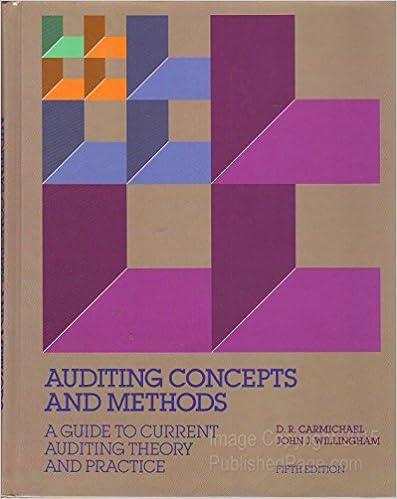The following questions relate to the use of analytical procedures in general planning. Select the best response.
Question:
The following questions relate to the use of analytical procedures in general planning. Select the best response.
a. Analytical procedures are
1. Statistical tests of financial information designed to identify areas requiring intensive investigation.
2. Analytical tests of financial information made by a computer.
3. Evaluations of financial information made by a study of plausible relationships among both financial and nonfinancial data.
4. Diagnostic tests of financial information which may not be classified as evidential matter.
b. As a result of analytical procedures, the independent auditor determines that the gross profit percentage has declined from 30 percent in the preceding year to 20 percent in the current year. The auditor should
1. Include an explanatory paragraph in his audit report indicating the inability of the client company to continue as a going concern.
2. Evaluate management's performance in causing this decline.
3. Require footnote disclosure.
4. Consider the possibility of an error in the financial statements.
c. Auditors sometimes use comparison of ratios as audit evidence. For example, an unexplained decrease in the ratio of gross profit to sales may suggest which of the following possibilities?
1. Unrecorded purchases.
2. Unrecorded sales.
3. Merchandise purchases being charged to selling and general expense.
4. Fictitious sales.
d. Significant unexpected differences identified by analytical procedures will usually necessitate a (an)
1. Consistency explanatory paragraph added to the audit report.
2. Review of internal control structure.
3. Explanation in the representation letter.
4 Auditor investigation.
Step by Step Answer:

Auditing Concepts And Methods A Guide To Current Auditing Theory And Practice
ISBN: 9780070099999
5th Edition
Authors: Mcgraw-Hill





